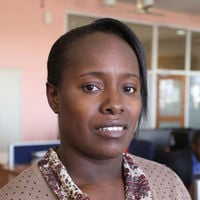
Emily Matelong, a teacher at Central Primary School in Eldoret town, Uasin Gishu County takes her standard six pupils through a Mathematics lesson on January 4, 2021. NMG PHOTO | JARED NYATAYA
Summary
- Thousands of children resumed in-person learning yesterday, the first time since March, amid challenges of social distancing to curb the spread of Covid-19 in schools.
- A spot check in schools across Nairobi showed that except for temperature checks and handwashing routines, things largely remained as they were before the pandemic, with pupils sharing desks and sitting shoulder-to-shoulder.
- Though many had protective masks, some of them wore them incorrectly—opting to wrap them around their chins instead of covering their mouths and noses.
Thousands of children resumed in-person learning yesterday, the first time since March, amid challenges of social distancing to curb the spread of Covid-19 in schools.
A spot check in schools across Nairobi showed that except for temperature checks and handwashing routines, things largely remained as they were before the pandemic, with pupils sharing desks and sitting shoulder-to-shoulder.
Though many had protective masks, some of them wore them incorrectly—opting to wrap them around their chins instead of covering their mouths and noses.
"The government has said our children must go, but they are not safe the way I see it," said Maurice Oduor, a 54-year-old parent at Nairobi’s Olympic Primary School, told Reuters, questioning how social distancing can be practised with about 100 students squeezed into each room.
"There are no classrooms built and no desks added here," he added.
Another parent, Maureen Adhiambo, said she was grateful her children had avoided the virus and were able to return to school on Monday.
"Our school is overcrowded, that is my biggest concern in bringing my children back," the 34-year-old told Reuters.
Kenya National Union of Teachers’ boss Wilson Sossion also expressed concern over the safety of students and teachers as schools reopened.
He said day schools, which number more than boarding ones, are disadvantaged as many do not have running water for handwashing while the government had not released funds to schools to purchase thermometers, sanitisers and other required items.
"When you give such directives to schools and you don’t give them funding... how are they expected to implement?" he said in an interview with the BBC’s Newsday programme.
"When you give such directives to schools and you don’t give them funding... how are they expected to implement?
The government has asked teachers to implement social distancing and hygiene guidelines to prevent the spread of coronavirus."
Education Cabinet Secretary George Magoha acknowledged the challenge of crowding but said the government would ensure learners and teachers have sufficient protective masks and hand sanitisers.
"Apart from overcrowding, everything else is normal, every child is masked and most of the masks were provided by the government," Prof Magoha said at Olympic Primary School in Kibera yesterday during an inspection visit.
More than 17 million students have missed nine months of school since March when the country reported its first case of Covid-19—forcing the government to order learning institutions shut as a precaution to curb the spread of the virus.
Aside from shutting schools, the government imposed curfews, banned social gatherings and at one point restricted movement in and out of the most affected counties.
Kenya has 96,908 confirmed cases of the covid-19 and 1,686 fatalities so far, amid calls for schools reopening to keep learners safe from abuse and early pregnancies.
The students’ population in public primary and secondary schools is expected to swell after a number of private institutions permanently shut due to the prolonged closure.
Data from the Kenya Private Schools Association (KPSA) shows that by December, some 331 private schools with a student population of 65,600 and that had employed 1,200 teaching and non-teaching staff had shut.
Yesterday, hundreds of parents and their children from various private schools gathered outside public schools to seek admission at the institutions.
Ayany Primary School Deputy Head teacher Elizabeth Nduati said the institution with a population of 1,500 had received hundreds of new pupils.
"We are ready to admit the new pupils and ensure they resume studies from where they started," she said.
At New Horizon Secondary School and Mashimoni private primary and secondary schools (in Kibera), the owners opted to co-share one compound after their structures were demolished mid last year.
Pupils in Grade Four, Class Eight and Form Four returned to class in October to prepare for standardised exams that were postponed from November to March. Those who reported yesterday commenced their second term that will end on March 19 under a crash programme as the government moves to recover the 2020 academic year.
The 2020 Kenya Certificate of Primary Education (KCPE) and the Kenya Certificate of Secondary Education (KCSE) examinations will start in March for four days and three weeks respectively.
Prof Magoha said measures for safe reopening of schools had been informed by lessons learnt from partial reopening of the institutions in October.





No comments :
Post a Comment